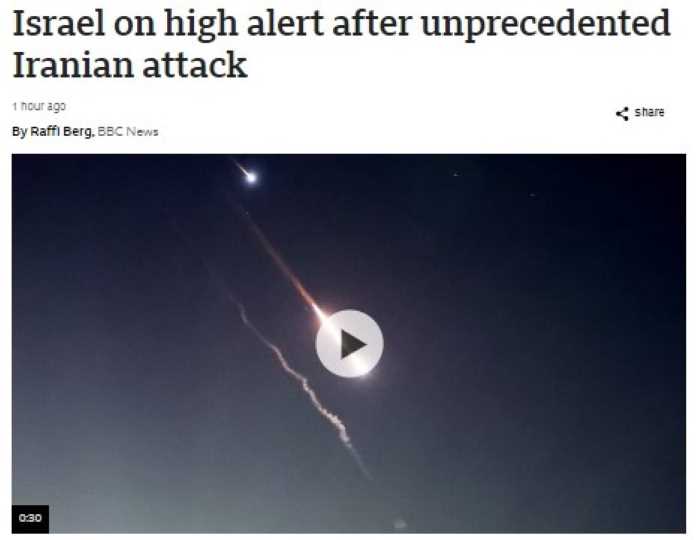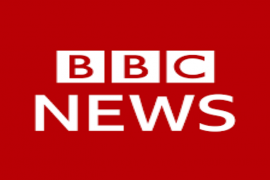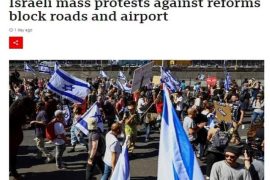Previously we noted the BBC’s continuing amplification of unconfirmed Iranian regime claims that a strike on April 1st took place at a diplomatic building in Damascus, including in coverage of Iran’s subsequent aerial attacks on Israel on the night of April 13th – 14th.
BBC NEWS CONTINUES TO PROMOTE IRAN’S NARRATIVE ON DAMASCUS BUILDING
Promotion of that narrative was also seen in most of the additional coverage of the Iranian attack on the BBC News website, which included the following reports: [emphasis added]
Filmed:
“Tel Aviv residents unfazed by Iran attack threat” uncredited, 14/4/24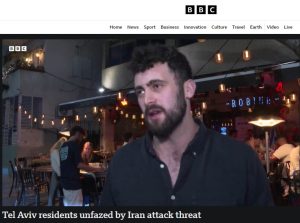
“Bars in the streets of Tel Aviv were still busy despite Iran launching dozens of drones and missiles at Israel in a retaliatory attack.
A university student described the evening as “usual night in Tel Aviv”.
Iran has launched dozens of drones and missiles at Israel in a retaliatory attack, the Iranian military has said”
“Israel-Iran: Sirens ring through Jerusalem as projectiles shot down from sky” uncredited, 14/4/24
“Sirens were activated in Jerusalem at around 01:45 local time (23:45 BST).
Loud explosions were heard with the air defence systems shooting down projectiles over the city, and multiple interceptions lit up the night sky.
Iran has launched dozens of drones and missiles at Israel in a retaliatory attack, the Israeli military has said.”
“Iran drone attack ‘major escalation’ – Israeli military” uncredited, 14/4/24
“Israeli military spokesman Daniel Hagari has described Iran’s attack as a “major escalation”.
Rr Adm Hagari said Iran had launched a “massive swarm” of drones and missiles at Israel late on Saturday. Most were shot down, he said.”
“Israel attack: ‘A very long night and a dangerous moment’” by Hugo Bachega, 14/4/24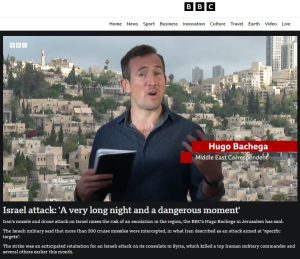
“Iran’s missile and drone attack on Israel raises the risk of an escalation in the region, the BBC’s Hugo Bachega in Jerusalem has said.
The Israeli military said that more than 300 missiles and drones were intercepted, in what Iran described as an attack aimed at “specific targets”.
The strike was an anticipated retaliation for an Israeli attack on its consulate in Syria, which killed a top Iranian military commander and several others earlier this month.”
“BBC Verify examines video from Iran’s attack on Israel” by Merlyn Thomas, 15/4/24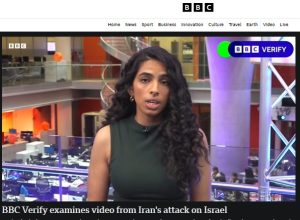
“Iran has for the first time ever carried out strikes against Israeli territory, after vowing retaliation for a deadly strike on its consulate in the Syrian capital Damascus.
Israel has not said it carried out the consulate strike, but is widely believed to have been behind it.
More than 300 drones and missiles were launched towards Israel over the weekend, according to the Israeli military.
BBC Verify’s Merlyn Thomas analyses the footage circulating online.”
Thomas’ report is notable for its ‘Israel says’ qualification of descriptions of the scale of the attack. The report briefly mentions “one child reportedly injured from shrapnel”.
Written:
“Israel on high alert after unprecedented Iranian attack” by Raffi Berg, 13/4/24
“Iran had vowed to retaliate for a strike on its consulate in Syria on 1 April which killed seven IRGC officers, including a top commander. It accused Israel of carrying out that attack, but Israel neither confirmed nor denied it.”
“Iran’s IRGC – the most powerful branch of its armed forces – said it had launched the attack “in retaliation against the Zionist regime’s [Israel] repeated crimes, including the attack on the Iranian embassy’s consulate in Damascus”.”
Berg tells readers that:
“Iran’s Islamic Revolution Guard Corps (IRGC) said the attack was aimed at “specific targets”.”
However he later notes that:
“Sirens sounded across Israel and loud explosions were heard over Jerusalem, with air defence systems shooting down objects over the city.”
Berg accurately reports that:
“Israel’s ambulance service said a seven-year-old Bedouin girl had been injured by shrapnel from falling debris in the southern Arad region.”
“What was in wave of Iranian attacks and how were they thwarted?” by Tom Spender, 14/4/24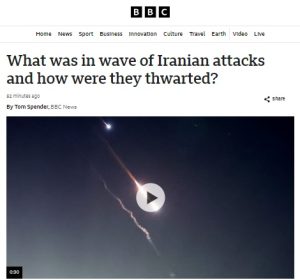
Spender’s account includes the following:
“The attack included 170 drones and 30 cruise missiles, none of which entered Israeli territory, and 110 ballistic missiles of which a small number reached Israel, military spokesman Rear Admiral Daniel Hagari said in a televised statement. The BBC has not independently verified those figures.”
Spender’s report is the only item of BBC coverage to inform audiences that, in addition to the Iranian attacks, missiles were also fired by Hizballah from Lebanon. However, readers are not told that one of those rockets hit a residential area in the town of Katzrin.
“The Iran-backed Hezbollah group in Lebanon also said it had fired two barrages of rockets at an Israeli military base in the occupied Golan Heights, a plateau which Israel has annexed from Syria in a move not recognised by most of the international community.”
Spender reports the injury of the little girl but errs with regard to her age.
“A 10-year-old girl was severely injured by shrapnel, Rear Adm Hagari said. The girl from a Bedouin Arab community near the southern town of Arad, was reported to have been injured after an Iranian drone was intercepted overhead. She was in intensive care.”
“Iran warns Israel against ‘reckless’ retaliation” by Doug Faulkner, 14/4/24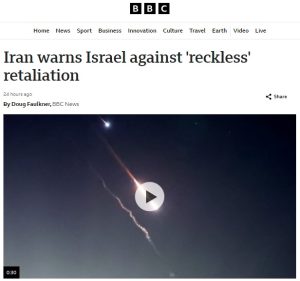
“More than 300 drones and missiles were launched at Israel by Iran overnight, following the 1 April Israeli strike on Iran’s consulate in Syria.”
“An attack had been anticipated after the strike on the Damascus consulate killed seven Islamic Revolutionary Guard Corps (IRGC) officers. […]
Iran’s IRGC – the most powerful branch of its armed forces – said it had launched the attack “in retaliation against the Zionist regime’s [Israel] repeated crimes, including the attack on the Iranian embassy’s consulate in Damascus”.
Faulkner tells his readers that:
“Sirens sounded across Israel and loud explosions were heard over Jerusalem, with air defence systems shooting down objects over the city.”
Failing to mention the two rounds of Hizballah rocket fire, he next goes on to promote the following claim:
“The New York Times, citing Israeli intelligence sources, reported that the main targets appeared to be military instillations in the occupied Golan Heights.”
The NYT update apparently cited by Faulkner actually reads as follows:
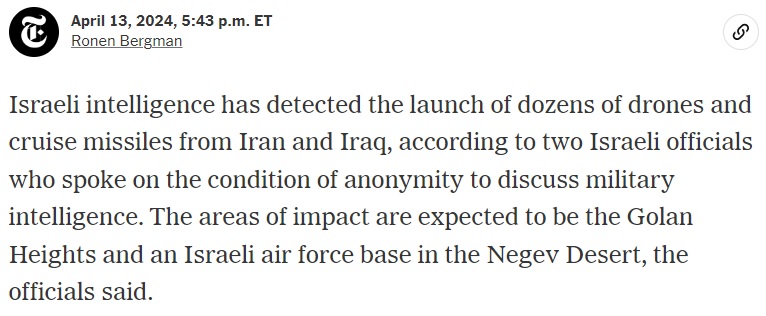
Faulkner’s report also misleads regarding the age of the injured girl:
“He [IDF spokesman] said a 10-year-old Bedouin girl had been severely injured by shrapnel from falling debris in the southern Arad region.”
As is now standard BBC practice, Faulkner uncritically promotes Hamas-supplied casualty figures that the BBC has not independently verified and which are increasingly doubtful.
“The subsequent Israeli military operation in Gaza has killed 33,729 people, mostly civilians, according to the Hamas-run health ministry.”
“Israel says it will respond to Iran attack ‘when time is right’” by Hugo Bachega, 14/4/24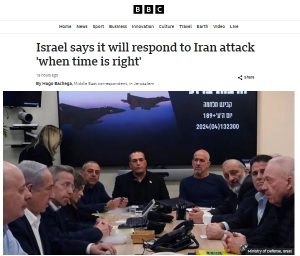
“For almost two weeks Iran had telegraphed its plans to respond to the 1 April air strike on its diplomatic compound in the Syrian capital, Damascus, that killed several military advisors, including two top generals. Iran blamed Israel for the attack, saying it was equivalent to a strike on its own soil.”
Unlike some of his colleagues, Bachega was able to get the age of the seriously injured girl right but no mention was made of additional people wounded in the same incident and the girl’s name – Amina al-Hassouni – does not appear in any of the BBC’s reports.
“The attack, in the end, had limited impact. A military base in the south sustained minor damage, the Israeli military said, and a seven-year-old Israeli girl was critically wounded by a missile that got through the defences.”
As we see, early BBC coverage of the Iranian regime’s unprecedented attacks on Israel on the night of April 13th– 14th overwhelmingly – and unquestioningly – promotes that regime’s talking points concerning the building in Damascus. That narrative has been employed by the Iranian regime – and uncritically amplified by the BBC – since April 1st as ‘justification’ for any subsequent actions in order to damp down criticism of any attack it may choose to stage.
While inconsistencies are evident in the numerous BBC reports on this story, the topic of support for the Iranian attacks from terror factions, Palestinians and their supporters was avoided throughout. Also notable – particularly in light of the BBC’s decision to run a filmed report about “unfazed” residents of Tel Aviv in a bar – is the lack of reporting on how the massive attacks by the Iranian regime affected Israeli citizens forced to seek shelter during the night and cope with the cancellation of educational activities.
Related Articles:
BBC REPORTING ON THE STRIKE ON IRCG OFFICERS IN DAMASCUS
BBC NEWS CONTINUES TO PROMOTE IRAN’S NARRATIVE ON DAMASCUS BUILDING

